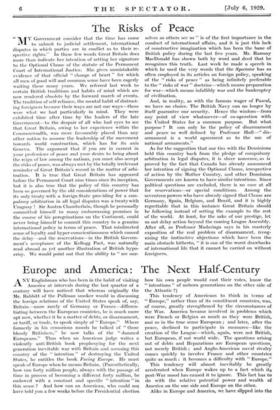The Risks of Peace Y Government consider that the time
has come to submit to judicial settlement, international disputes in which parties are in conflict as to their re- spective rights." In these few words Great Britain does more than indicate her intention of setting her signature to the Optional Clause of the statute of the Permanent Court of International Justice. She gives unmistakable evidence of that official "change of heart" for which all men of good will and common sense have been eagerly waiting these many years. We referred last week to certain British traditions and habits of mind which are now rendered obsolete by the forward march of events. The tradition of self-reliance, the mental habit of distrust- ing foreigners because their ways are not our ways—these were what we had particularly in mind. They were exhibited time after time by the leaders of the late Government—to the despair of all who had eyes to see that Great Britain, owing to her experience within the Commonwealth, was more favourably placed than any other nation to assume the leadership of the movement towards world construction, which has for its axis Geneva. The argument that if you are in earnest in your professions of peace and your desire to bring about the reign of law among the nations, you must also accept the risks of peace, was always met by the totally irrelevant reminder of Great Britain's record in the matter of arbi- tration. It is true that Great Britain has appeared before the Permanent Court nine times since its inception, but it is also true that the policy of this country has been so governed by the old considerations of power that its only treaty with a foreign State providing for a com- pulsory arbitration in all legal disputes was a treaty with Uruguay ! Sir Austen Chamberlain, though he personally committed himself to many embarrassing promises in the course of his peregrinations on the Continent, could never bring himself to commit this country to a genuine international policy in terms of peace. That misdirected sense of loyalty and hyper-conscientiousness which caused the delay—and the reservations—in the British Govern- ment's acceptance of the Kellogg Pact, was naturally read abroad as yet another illustration of British hypo- crisy. We would point out that the ability to "see our- selves as others see us" is of the first importance in the conduct of international affairs, and it is just this lack of constructive imagination which has been the bane of British policy during the last five years. Mr. Ramsay MacDonald has shown both by word and .deed that he recognizes this truth. Last week he made a speech in which he used the very words that the Spectator has so often employed in its articles on foreign policy, speaking of the "risks of peace" as being infinitely preferable to the " risks of war " doctrine—which means preparation for war—which means infallibly war and the bankruptcy of civilization.
And, in reality, as with the famous wager of Pascal, we have no choice. The British Navy can no longer by itself guarantee our security. Hence the wisdom—from any point of view whatsoever—of co-operation with the United States for a common purpose. But what purpose ? It can only be the policy of disarmament and peace so well defined by Professor Hull—" dis- armament is a world agreement as to the use of national armaments."
As for the suggestion that our ties with the Dominions held this country back from the pledge of compulsory arbitration in legal disputes, it is sheer nonsense, as is proved by the fact that Canada has already announced her intention of signing the Optional Clause, irrespective of action by the Mother Country, and other Dominion Governments are known to have similar intentions. Since political questions are excluded, there is no case at all for reservations—or special conditions. Among the seventeen powers who have already signed that Clause are Germany, Spain, Belgium, and Brazil, and it is highly regrettable that in this instance Great Britain should be following instead of setting the example to the rest of the world. At least, for the sake of our prestige, let us not delay action beyond the coming League Assembly. After all, as Professor Madariaga says in his masterly exposition of the real problem of disarmament, recog- nizing the instinctive objections which have been the main obstacle hitherto, "it is one of the worst drawbacks of international life that it cannot be carried on without foreigners.










































 Previous page
Previous page